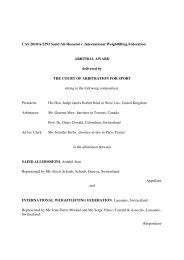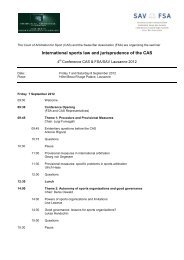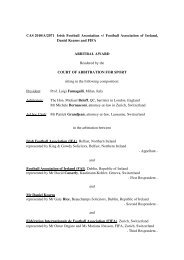(CAS) Bulletin - Tribunal Arbitral du Sport / TAS
(CAS) Bulletin - Tribunal Arbitral du Sport / TAS
(CAS) Bulletin - Tribunal Arbitral du Sport / TAS
You also want an ePaper? Increase the reach of your titles
YUMPU automatically turns print PDFs into web optimized ePapers that Google loves.
initials corresponding to those of Mr Contador<br />
were found in certain handwritten documents of Dr<br />
Fuentes and Mr Jörg Jaksche testifi ed accordingly in<br />
his own doping case. Finally, Mr Contador’s current<br />
team manager, Mr Bjarne Riis admitted to having<br />
used performance-enhancing drugs <strong>du</strong>ring his career.<br />
WADA does not argue that these alleged facts are<br />
suffi cient in themselves to establish that Mr Contador<br />
should be sanctioned for an anti-doping rule<br />
violation. However, according to WADA, the tainted<br />
environment in which the Athlete lives, enhances the<br />
likelihood that the source of the adverse analytical<br />
fi nding is doping rather than a contaminated piece<br />
of meat. Furthermore, these facts contradict the<br />
statement of the Athlete who misleadingly claims<br />
that he has always been surrounded by “ people (cyclists,<br />
doctors, trainers, etc.) who categorically reject the use of doping<br />
substances ”. The statement of Mr Contador, claiming<br />
that he does not know the highly controversial Dr<br />
Fuentes is also undermined by the admissions of his<br />
former team-mate Mr Jörg Jaksche.<br />
Mr Contador submits that the Appellants’ attempt<br />
to fashion his guilt by association is not only<br />
unacceptable but also carries no evidentiary weight.<br />
Prof. Hans Michael Riemer concludes in his expert<br />
report that reliance on such evidence would be<br />
contrary to Swiss law. “ One could argue that relying on<br />
the fact that former teammates committed a doping offence in<br />
the past to rebut the contention that a prohibited substance was<br />
ingested by meat contamination would amount to a fi nding of<br />
guilt by association. Moreover, taking into account behaviours<br />
or con<strong>du</strong>cts for which the accused person is not responsible<br />
is intrinsically in violation of the requirement of <strong>du</strong>e process<br />
because the accused person is deprived of his or her right to<br />
defence, given that he or she has no infl uence or control over the<br />
relevant facts. […] Relying on the fact that doping is allegedly<br />
widespread in cycling at any stage of the legal reasoning leading<br />
to the imposition of a sanction would not only be arbitrary as<br />
such, but also run against the principle nulla poena sine lege<br />
certa ”.<br />
Findings of the Panel<br />
The Panel considers that the tainted environment<br />
of the Athlete should carry no evidentiary weight in<br />
assessing whether Mr Contador underwent a blood<br />
transfusion or not.<br />
No person in the “environment ” of Mr Contador saw<br />
or alleged that Mr Contador underwent a blood<br />
transfusion. No person submitted that Mr Contador<br />
knew of their wrongdoings or that they acted in part<br />
or entirely in concert with each other. This is all the<br />
more surprising since the blood transfusion scenario<br />
implies that at least a group of people must have<br />
been involved (Athlete, donor of plasma, somebody<br />
harvesting the plasma, somebody storing the plasma<br />
and blood bags, somebody re-injecting the plasma<br />
and the blood, etc).<br />
Being in “bad company ” is no more or less of an<br />
indication of illicit behaviour for an athlete than<br />
family ties are between cattle farmers (see supra).<br />
In saying that, the Panel also notes that being in<br />
“good company ” is no indication whatsoever that an<br />
Athlete is not involved in doping. The same applies,<br />
in principle, to the evidentiary value of personal<br />
declarations by an athlete alleging that he has never<br />
doped before.<br />
Finally, the Panel does not ignore the fact that Mr<br />
Contador himself used a similar argument in putting<br />
forward several investigations of the Spanish police<br />
regarding meat contamination cases in order to make<br />
it more likely that the farm of Mr Lucio Carabias<br />
illegally fattened its cattle. However, in view of its<br />
above-developed reasoning concerning the meat<br />
contamination theory, the Panel did not give any<br />
specifi c evidentiary weight to the said investigations<br />
either, and fi nds that the actions of certain persons,<br />
or certain general circumstances, should not in<br />
principle affect the way the evidence concerning a<br />
specifi c person or case is taken into consideration<br />
and evaluated. The same standard of assessment is<br />
therefore applied to the arguments of both sides in<br />
this dispute.<br />
5.2. The Athlete’s blood parameters<br />
Submissions by the Parties<br />
WADA submits that following the intro<strong>du</strong>ction<br />
of the ABP in cycling, professional cyclists have<br />
admitted to masking practices that hide the use of<br />
blood transfusions.<br />
In that relation, it submits that the variation of blood<br />
parameters can be manipulated in order to obtain a<br />
blood profi le consistent with natural values. Blood<br />
transfusions can be detected notably because they<br />
lead to an increase of haemoglobin values. The spike<br />
in haemoglobin values can however be artifi cially<br />
diminished by an addition of plasma to dilute blood.<br />
After a transfusion, a diminution of the reticulocytes<br />
values is observed. In order to mask this variation,<br />
athletes use microdose injections of an erythropoiesis<br />
stimulating agent.<br />
According to WADA, Mr Contador chose to rebut<br />
the accusation of doping in the proceedings before<br />
the CNCDD of the RFEC by referring to his blood<br />
parameters. These parameters would supposedly<br />
Jurisprudence majeure / Leading cases<br />
-<br />
127





